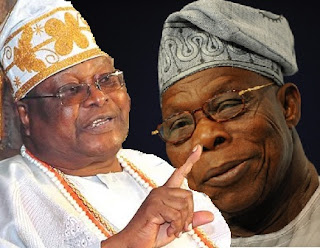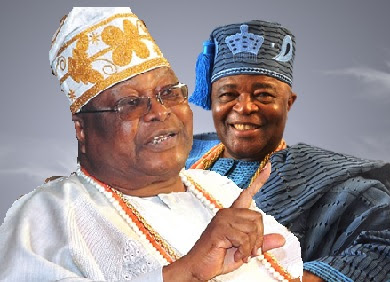More facts have emerged why the relationship between former President Olusegun Obasanjo and the Awujale of Ijebuland, Oba Sikiru Adetona fell apart.
According to the estranged monarch, he fell out with former President Olusegun Obasanjo when the latter failed to address the issue of true federalism in the country as president, report by Punch Newspaper says
The Awujale said though Obasanjo had promised to address the issue of true federalism before the 1999 elections, but on getting to office, he did otherwise.
He said, “With Obasanjo finally settled in office, I went to see him at Aso Rock in Abuja. I sought to meet with him so that we could discuss the contentious issue of true federalism in the nation and the future association of the constituents. He had talked a great deal along this line before going into office and so I never anticipated any problem with him on the matter. I urged him to provide a solid structure for the country. Obasanjo declined to call any national conference on federalism and I was very disappointed. This was the dividing line for me in our relationship.
“During one of my visits to Aso Rock, Obasanjo revisited the issue. He asked if I remembered that I had called him a Judas. I told him I not only remembered but still maintained that he was a Judas who would betray his people. I did not give up pressing on the federalism issue. In September 2002, I went again to see him at Aso Rock on the need for the constituents of the nation to discuss our association. There was no positive response from him. In my disappointment, I told him before leaving that his case would end up like that of a snake crawling on a rock without leaving a footprint.”
This was excerpted from Chapter 12 of the monarch’s autobiography, titled “Awujale: The Autobiography of Alaiyeluwa Oba S.K. Adetona Ogbagba II,” from pages 171 to 183.
Excerpts from pages 187-195 of the book, which was published in 2010 by Mosuro Publishers, had recently gone viral for reasons unknown.
In the book, Awujale accused Obasanjo of using the then Chairman of the Economic and Financial Crimes Commission, Nuhu Ribadu, to persecute billionaire businessman and founder of Globacom, Otunba Mike Adenuga.
According to the monarch, Obasanjo believed Adenuga was fronting for the then Vice-President, Atiku Abubakar, and a former military dictator, Ibrahim Babangida.
The monarch alleged that Adenuga was detained and harassed because Obasanjo was fighting with Atiku and Babangida at the time. Awujale further described Obasanjo’s eight-year tenure as a complete waste “short of tangible achievements.”
However, Obasanjo in a letter dated December 30, 2016, which was addressed to the Awujale, berated the monarch while describing him as a liar and a rumour-monger.
The ex-President said, “Your assertion in the publication was a tissue of lies and untruths.”
Obasanjo said he did not expect the monarch to be objective as regards Adenuga since the billionaire was his cousin.
While the controversy rages on, the traditional ruler had revealed from pages 171 to 183 of the book his role in helping Obasanjo become Nigeria’s president in 1999.
He said, “The (1999) presidential election was looming and Sunday Awoniyi, on behalf of the Peoples Democratic Party, approached me to recommend a possible Yoruba candidate for them. In my opinion, the most serious problems facing the country at the time were its economic challenges. So the man I believed we needed had to be someone who had a comprehensive grasp of national economics.
“I also thought that Nigeria needed a man with international exposure to lead the country responsibly in the global scene. The man also had to be detribalised and clean, with a passion to put things right for our nation. As I saw it, Prof. Adebayo Adedeji was the one who met these criteria and I recommended him.”
Adedeji is a professor of Economics and a former Executive Secretary of the Economic Commission on Africa and Under-Secretary General of the United Nations. He had served as a Minister of Economic Planning and Reconstruction in General Yakubu Gowon’s government.
The Awujale said the PDP accepted Adedeji as a qualified candidate but had to reject him because he belonged to the Alliance for Democracy.
“Meanwhile, Obasanjo was struggling for acceptance and to be adopted as a candidate. He had never been a politician other than the fact that he had been a former military Head of State; he had no political constituency,” he said.
“He paid regular and almost daily visits to me in the “aafin” (palace) to plead with me to support his candidature. There was also pressure on me on behalf of Obasanjo from Chief S.O. Bakare and Otunba Reuben Fasawe. When no other Yoruba man emerged from the PDP, I had a discussion with Obasanjo on the travails of the country, on one of his visits. We both agreed on how good leadership alone could salvage the nation.
“In the end, I agreed to support his candidacy and that was a turning point in our relationship. Even after I gave him my support, Chief Awoniyi still came to me, seeking assurance that Obasanjo would perform well. I told him that Obasanjo had promised to serve the nation diligently and pull Nigeria out of the doldrums.”
The monarch said he also intervened when the AD started questioning the election that produced Obasanjo after its (AD) candidate, Chief Olu Falae, lost the election.
Earlier in Chapter 12 of the autobiography, titled: “Political Manoeuvres”, the monarch revealed how he brokered a meeting between the PDP and the AD, which nearly ended up in a merger of the parties before negotiations broke down.
He emphasised that one of the conditions he gave the PDP team, which was led by Alhaji Bamanga Tukur and Sunday Awoniyi, was that a Yoruba man must become the president if the country must experience any form of stability.
“I brought out a newspaper clipping in which I had been quoted as saying that the new dispensation would succeed only if a Yoruba was put at the helm of affairs of the nation. When they read it, they told me that was exactly their own position too.”
The Oba recalled that he had to warn the PDP team, which was already discussing with some AD chieftains in meetings brokered by him, not to foist just any Yoruba man on the nation.
He said, “I was giving the warning because I was aware that a ‘Judas’ had been found among the Yoruba, whom they were trying to impose on us. When they asked me who this Judas was, I replied that it was Olusegun Obasanjo. They denied this, and told us they had not accepted him as their candidate.”
The monarch explained that he supported Obasanjo’s second term “not because he was a great achiever during the first term, but because I thought he was still needed for the stability of the country, if for nothing else.”
In the book, Awujale also recalled how on the day Chief Abraham Adesanya, a late Afenifere chieftain, was celebrating his 80th birthday in 2002; he had told Obasanjo to his face that he was not credible.
He said, “After the service, Obasanjo invited me to join him in his car on the ride to Abusi Edumare Assembly in Ijebu-Igbo where his helicopter was waiting to pick him up. It was a ride in a Mercedes limousine car and he and I were seated at the back while Governor (Olusegun) Osoba sat opposite us.
“It was going to be a short trip but I had something to say and so it had to be said quickly enough while the three of us shared some privacy.
“I said there was a time when I had trusted Obasanjo so much that I could swear by his name, but that the trust was now gone.
“Obasanjo asked why. I answered that Obasanjo was no longer credible. Silence descended in the car for the rest of the journey to the pad where the helicopter was parked. We escorted him to the helicopter and he flew off.”
However, Awujale’s autobiography did not talk much about an alleged bid by Obasanjo to spend three terms in office, but said Obasanjo avoided discussing the issue with him.


